December 2017 Ideas and Innovation
Read the articles selected in December 2017
Streaming: le marché de la musique a retrouvé sa voie
By Olivier Pellerin
Source: Libération, 9 December
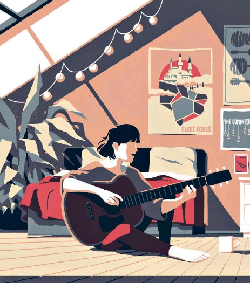
The streaming has given new life to the musical market, which after many years is recovering with multiplying contracts and a new interest for young artists. The decline of the physical support and the property as the form of consumption allows an immediate spread of the latest products all over the world.
La reconnaissance faciale envahit le quotidien
By Simon Leplâtre
Source: Le Monde, 10 December
In China, facial recognition technologies are pervasive and especially advanced in the security sector, where they are used for the active crime prevention. For the Chinese society, the social control in the public sphere is not a problem, and its acceptance makes algorithms ever more intelligent.
Saturn’s rings a recent addition to the solar system, Cassini observations show
By Paul Voosen
Source: Science, 12 December
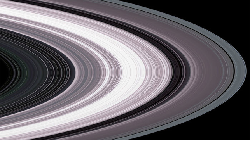
The data collected in the last months by the spacecraft Cassini show that the Saturn rings have been formed after the planet, less than 200 millions years ago. The evidence is the comparison of the respective gravitational forces, hence their masses, and the measurement of the micrometeorites’ flux resulting from a recent explosion.
Read more:
Children in a Digital World
Source: Unicef
ICT technologies provide new opportunities for education but make children more vulnerable to risks for their physical integrity and their psychic health. The whole world has become accessible through the internet, but this is changing childhood with an impact which is an object of research and growing public concern.
Read more:
https://www.unicef.org/publications/files/SOWC_2017_ENG_WEB.pdf
I enlisted an algorithm to help me write the perfect piece of science fiction.
By Stephen Marche
Source: Wired, 6 December
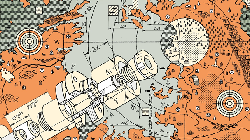
Researchers have developed a software which analyzes a literary database made of 50 sci-fi stories, extrapolating narrative structures, stylistic patterns and a set of rules on how to shape topics, driving the writer to optimize his tale step by step. Will be there another story?
Read more:
https://www.wired.com/2017/12/when-an-algorithm-helps-write-science-fiction/
Un satellite français vérifie la théorie de la relativité générale
By Marc Cherki
Source: Le Figaro, 5 December
The Physical Review Letters have published the result of the satellite mission launched last year by the Cnes Microscope, which confirms the principle of equivalence between gravitation and acceleration by the Einstein theory with a precision ten times higher than the previous experiments.
Carlos Moedas di Celeste López
Source: La Vanguardia, 6 December
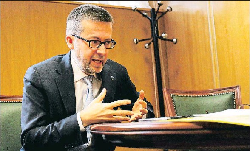
After Carlos Moedas, responsible for the European science policy, it is crucial that citizens understand the importance of research and innovation for their lives, for improving economic growth and reducing the crises, including the migratory ones. They only can press politics towards major investments.
La pollution lumineuse gagne du terrain sur Terre
By Pauline Fréour
Source: Le Figaro, 5 December
The lighting pollution, especially if caused by blue light, is a stress agent who perturbates important functions of the flora and the nocturne fauna, putting at risk the biodiversity. Yet the only limit considered in the public enlightenment is economic.
The genesis of Kuri, the friendly home robot
By Matt Simon
Source: Wired, 30 November
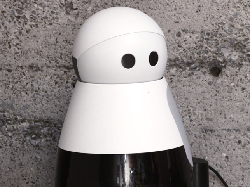
Kuri is our new companion. Originally conceived as a security robot for homes, its anthropomorphic form and its ability to interact with us and to navigate our domestic spaces opens a new era of affection relations and a new way of communicating and being human.
Read more:
https://www.wired.com/story/the-genesis-of-kuri/
Artem ressuscite “l’école de Nancy”
By Sophie Blitman
Source: Le Monde, 28 November
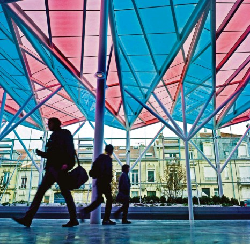
Artem is a project which has gathered the secondary schools of art, engineering, and business in Nancy to put in touch different skills and cognitive sets in a perspective of interdisciplinarity and innovation aimed at the world of work while discovering the classical tradition and the Art Nouveau.
“Alien” DNA makes proteins in living cells for the first time
By Ewen Callaway
Source: Nature, 29 November

Researchers have manipulated bacterial cells incorporating a synthetic base pair in their DNA in order to make a modified version of a green fluorescent protein. This achievement allows producing proteins with properties not found in natural amino acids, that could be used in new drugs.
Read more:
https://www.nature.com/news/alien-dna-makes-proteins-in-living-cells-for-the-first-time-1.23040
Sea level rise will imperil humanity’s future and its past
By Matt Simon
Source: Wired, 29 November
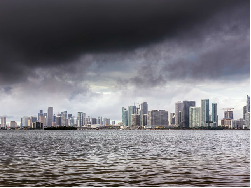
Climate change imperils not only our real estates and infrastructures. A sea level rise of one meter is expected to submerge 13000 coastal archaeological and historical sites in the United States, so researchers are working on a database to decide which sites to save before the end of this century.
Read more:
https://www.wired.com/story/sea-level-rise-will-imperil-humanitys-future-and-its-past/
Info
- Pubblicato il : 15/01/2018 Modificato il : 04/04/2019

